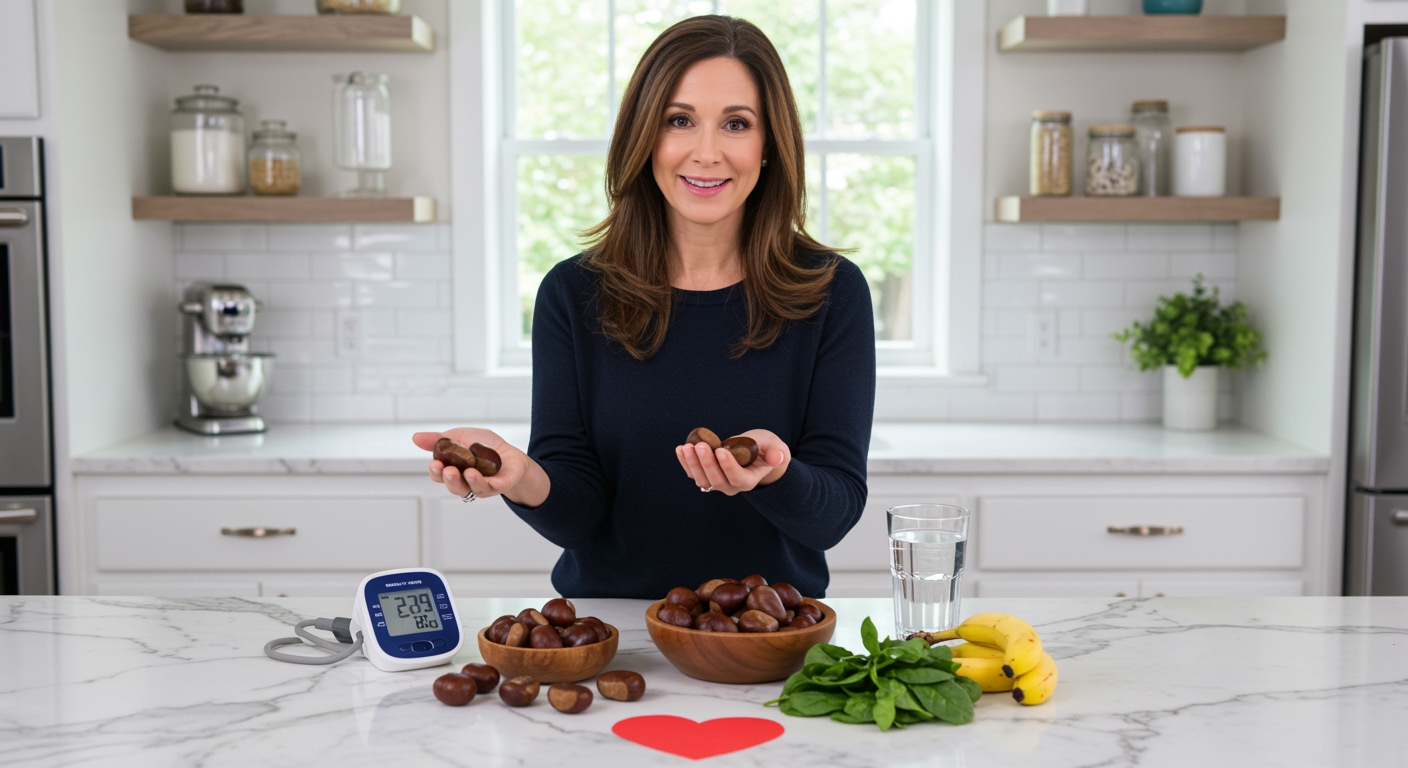✪ Key Takeaway: Chestnuts can help lower blood pressure through high potassium content and antioxidants that support cardiovascular health.
Introduction
Your doctor just told you that your blood pressure is creeping up, and now you are wondering if there are natural ways to bring those numbers down.
You might be asking this question because you want to avoid medication or simply add more heart-healthy foods to your daily routine.
Hi, I am Abdur, your nutrition coach, and today I am going to explain how chestnuts can naturally support healthy blood pressure levels through their unique nutritional profile.
What Makes Chestnuts Special For Blood Pressure?
Chestnuts stand out from other nuts because they contain an impressive amount of potassium, a mineral that directly impacts blood pressure regulation.
One cup of roasted chestnuts provides about 518 milligrams of potassium, which is roughly 11% of your daily needs.
This potassium works by helping your kidneys remove excess sodium from your bloodstream through urine.
When sodium levels drop, your blood vessels can relax, which naturally reduces pressure on your arterial walls.
Unlike many other nuts that are high in fat, chestnuts are naturally low in fat and calories, making them easier to include in a heart-healthy diet without worrying about weight gain.
The fiber content in chestnuts also supports cardiovascular health by helping maintain healthy cholesterol levels, which indirectly benefits blood pressure management.
✪ Fact: Chestnuts contain 60% less fat than most other nuts, making them unique in the nut family.
How Do The Antioxidants In Chestnuts Help?
Chestnuts contain powerful antioxidants including vitamin C, gallic acid, and ellagic acid that protect your blood vessels from damage.
These antioxidants work by neutralizing free radicals that can cause inflammation in your arterial walls.
When your arteries become inflamed, they tend to stiffen and narrow, which forces your heart to work harder and increases blood pressure.
The vitamin C in chestnuts specifically helps maintain the elasticity of your blood vessels by supporting collagen production.
Flexible blood vessels can expand and contract more easily with each heartbeat, which helps maintain normal pressure levels.
Research shows that people who consume foods rich in these specific antioxidants tend to have better cardiovascular health outcomes over time.
✪ Pro Tip: Eat chestnuts with the skin on when possible to maximize your antioxidant intake.
What Does The Research Actually Say?
While direct studies on chestnuts and blood pressure are limited, research on their individual nutrients provides compelling evidence.
Multiple studies have shown that increasing potassium intake can reduce systolic blood pressure by 3-5 mmHg in people with hypertension.
The DASH diet, which emphasizes potassium-rich foods, has been proven to lower blood pressure as effectively as some medications.
Studies on antioxidant-rich foods show that regular consumption can improve endothelial function, which is how well your blood vessels dilate and contract.
Poor endothelial function is one of the earliest signs of cardiovascular disease and often precedes high blood pressure.
The combination of potassium and antioxidants in chestnuts creates a synergistic effect that may be more beneficial than either nutrient alone.
✪ Note: The DASH diet recommends 4,700mg of potassium daily for optimal blood pressure benefits.
How Should You Include Chestnuts In Your Diet?
The most effective way to use chestnuts for blood pressure support is to eat them regularly as part of a balanced diet.
A serving size of about 10-15 chestnuts provides meaningful amounts of potassium without excessive calories.
You can roast them at home, add them to soups and stews, or use chestnut flour in baking recipes.
Roasted chestnuts make an excellent snack replacement for processed foods that are often high in sodium.
Remember that chestnuts work best when combined with other heart-healthy foods like leafy greens, berries, and whole grains.
The key is consistency rather than eating large amounts occasionally, as your body needs steady potassium intake to maintain optimal blood pressure levels.
✪ Pro Tip: Soak raw chestnuts for 30 minutes before roasting to make them easier to peel and digest.
Are There Any Limitations Or Precautions?
While chestnuts are generally safe for most people, there are some important considerations to keep in mind.
People taking blood pressure medications should consult their doctor before significantly increasing potassium intake, as this can affect medication effectiveness.
Those with kidney disease need to be particularly careful with potassium-rich foods, as their kidneys may not process excess potassium properly.
Chestnuts alone will not cure high blood pressure, and they work best as part of an overall lifestyle approach that includes regular exercise and stress management.
Some people may experience digestive discomfort if they eat large amounts of chestnuts, especially if they are not used to high-fiber foods.
Always choose fresh or properly stored chestnuts, as moldy nuts can contain harmful compounds that may actually increase health risks.
✪ Note: Start with small portions of chestnuts and gradually increase to avoid digestive issues.
The Bottom Line
Chestnuts can indeed help support healthy blood pressure levels through their impressive potassium content and beneficial antioxidants.
Small, consistent dietary changes often create the biggest health improvements over time.
I would love to hear about your experience with chestnuts or any questions you might have about using food to support your cardiovascular health, so please share your thoughts in the comments below.
References
At NutritionCrown, we use quality and credible sources to ensure our content is accurate and trustworthy. Below are the sources referenced in creating this article:





